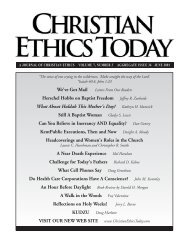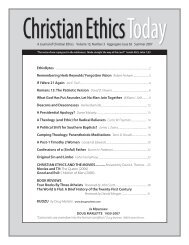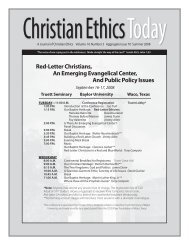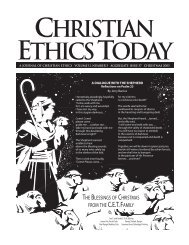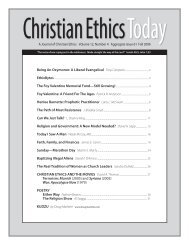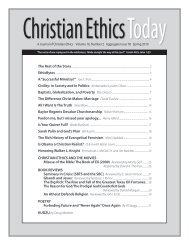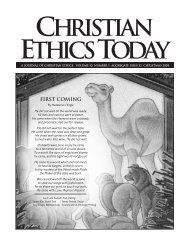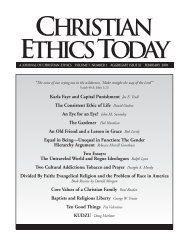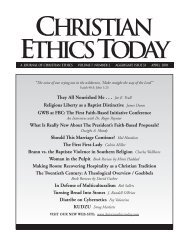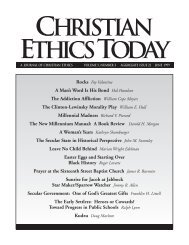Issue 048 PDF Version - Christian Ethics Today
Issue 048 PDF Version - Christian Ethics Today
Issue 048 PDF Version - Christian Ethics Today
You also want an ePaper? Increase the reach of your titles
YUMPU automatically turns print PDFs into web optimized ePapers that Google loves.
use of titles and the formal Usted are commonly employed in<br />
the context of a Hispanic family. To fail to understand and<br />
know how and when to use these basic courtesies is to<br />
demonstrate a lack of education. I am not talking about<br />
degrees earned but basic rules of engagement for those in the<br />
family.<br />
Even with “Machismo” (the masculine characteristic<br />
associated with dominance, strength, virility, and sex), the<br />
Hispanic is commonly known as a matriarchal society. The<br />
mother or wife appears to be submissive, but we all know<br />
who calls the shots. She influences the husband and often<br />
leads him behind the scenes. We just look like we are in<br />
charge if you know what I mean. While American Hispanics<br />
tend to adapt and acculturate to mainstream practices, they<br />
do not Americanize family patterns.<br />
Toward Becoming Biblically Authentic Families<br />
Iwould like now to talk about forming biblically authentic<br />
families. When I say “Biblically Authentic,” I am referring<br />
to the kinds of relationships found in families that reflect the<br />
message of Jesus in the Gospels and the implementation of<br />
Jesus teachings in the early church. Rodney Clapp, editor for<br />
InterVarsity Press, in 1993 wrote a book called Families at<br />
the Crossroads: Beyond Traditional and Modern Options. He<br />
contends the idea that the family is the first and foremost<br />
institution for God on the earth is really not a truly biblical<br />
hermeneutic on the family, if indeed we interpret the scriptures<br />
through the life and work of Jesus. Whether we are<br />
talking about singles, single-parent families, or traditional<br />
families, Clapp suggests that the church is the first and foremost<br />
institution of God in the earth. It is the church, the<br />
family of faith that is at the cutting edge of redemptive history,<br />
not the family. Our families are then subject to the teachings<br />
of Jesus as represented in the Bible and lived out in the<br />
church.<br />
Jesus created a new family, a family of followers. The<br />
Apostle Paul tells us in Romans 8:29 that Jesus is the first<br />
among many brethren. Clapp contends that allegiance to the<br />
Kingdom of God precedes allegiance to the family. Jesus did<br />
not destroy the family, he came to affirm it. Jesus once again<br />
leads the way as he develops his family of followers and even<br />
6 • FEBRUARY 2004 • CHRISTIAN ETHICS TODAY<br />
refers to his family as “whoever does the will of my God is my<br />
brother, sister and mother” (Mark 3:34-35).<br />
In the same fashion the Apostle Paul held the family of<br />
faith in high regard. The Apostle Paul used the phrase “my<br />
brothers” 64 times in his letters and referred to the family of<br />
faith as his children. 9 The Apostle Paul referred to the<br />
church, “which meets in your house.” He referred to a house<br />
or household when thinking about how the gospel would<br />
impact families in the first century (Acts 16:31). “Believe on<br />
the Lord Jesus Christ and you will be saved, you and your<br />
household (oikos).” A household in the first century could<br />
hold up to 50 or 60 people. 10<br />
Dr. Thomas A. Wolf, futurist, author, missional strategist,<br />
and missionary has developed the notion of household<br />
or oikos after an extensive study of the Greek term. After consulting<br />
sociologists at major universities, Wolf has crafted a<br />
universal definition for household/oikos. He says that an oikos<br />
is your circle of influence composed of family, neighbors,<br />
coworkers, and friends—or your biological world, your geographical<br />
world, your vocational world, and your volitional<br />
world. You can abbreviate it even more by calling it your Bio,<br />
Geo, Voc, and Vol world. In fact, Wolf says that most sociologists<br />
agree that whether you are talking about urban or<br />
rural, rich or poor, all relationships in life can be categorized<br />
into these groupings. In the first century, the household<br />
included the nuclear family, extended family, slaves, workers,<br />
travelers, and foreigners, a kind of collective view of the<br />
household and family, a grouping of people. Rodney Stark,<br />
in his book The Rise of <strong>Christian</strong>ity says that this was the<br />
secret of the rapid growth of the early church. There were<br />
simultaneous conversations about Jesus among open networks<br />
of relationships already in place. Dr. Wolf has noted<br />
that the average person has about 70 people in his or her<br />
oikos. Take the number of people in your church, multiply by<br />
70 and you will get an idea of the existing relationships<br />
impacted by your ministry through the oikos. If this was a<br />
conference on evangelism, we would spend the rest of the<br />
time talking about how this concept plays itself out in your<br />
community and what you can do to naturally spread the<br />
supernatural message of Jesus through the webs of existing<br />
relationships.



